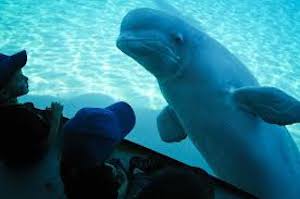An important victory for animal welfare took place in 2020 when, thanks to the work of a coalition of animal protection groups, the US National Marine Fisheries Service agreed, for the first time, to ban the captive breeding of five beluga whales soon to be imported from Canada. This is a crucial step towards finally ending the cruelty and injustice of whale and dolphin captivity. Activists had expressed concern that the real purpose of the import permit was to help maintain a captive beluga population for public display in the United States.
A proposed reproduction study that would have bred the belugas, then used them to conduct research on the pregnant females, and later on their offspring, was denied by US authorities. Other conditions of the import permit included a prohibition against the aquarium (Mystic Aquarium in Connecticut) using the whales in public interactive programs or training them for performances. While it would have been far better to have the whales go to sanctuaries, we can at least have the satisfaction of knowing that future generations of belugas won’t suffer the nightmare of captivity.
Under Bill S-203, which Canada passed in 2019, whales, dolphins and porpoises can be imported or exported only with a permit from the Minister of Fisheries and Oceans, only for specific and strictly-defined purposes, and if it’s deemed to be in the best interest of the animals. Since the law’s passage, Marineland has been trying to dispose of what, to them, are valuable assets to be bought and sold (but to us are nonhuman persons fully deserving of their lives and liberty). It’s very clear by now that they have no intention of sending any of their ‘stock’ to sanctuaries, and instead have been seeking opportunities to sell them abroad – anywhere that cetacean captivity remains legal.
Activists, of course, have resisted all the way, with the fear being that what we’ve managed to end in Canada we’d be helping to perpetuate elsewhere. Now, with this US ruling, I’d say a decision by Canada’s ministry to allow the sale might even be welcome. Given Marineland Canada’s abysmal record of animal neglect, it’s arguable that these five whales will be better off at Mystic.
Let’s be clear. Cetaceans born into captivity do avoid the suffering inflicted on their formerly wild cousins by the brutal capture, training and transport process. But in the overall, it makes no practical difference to the question of the injustice of captivity. Whether you are born into servitude, or deprived of your freedom and dragged in later, the bulk of your suffering takes place when you’re forced to spend the rest of your life in a sterile, indescribably confined environment which lacks nearly everything a sentient and sapient individual needs to be happy.
In October of 2020 SeaWorld Orlando made the following ‘joyful’ announcement:
“We have exciting news! Bree, the Atlantic bottlenose dolphin, became a new mother recently. Join us in welcoming the newest member of the family.”
They go on to trumpet how guests got a glimpse of something truly special when this first-time mom gave birth, and that their zoological team, which “specializes in dolphin care”, will be keeping a close eye on mother and baby, and providing “expert 24/7 care”. One has to wonder how dolphins do so well in the wild without a team of veterinarians standing by! The truth is that dolphins suffer a number of mostly stress related illnesses in captivity which they don’t experience in the wild, and are far more in need of this medical attention precisely because of the conditions in which they are forced to live.
When I see such announcements, I can’t help but feel enormous sympathy for this poor little dolphin who may never know a day of freedom in her life. That is, unless we can successfully advocate for her to be moved to a sanctuary one day. (Release into the wild is highly unlikely because there will never have been anyone to teach her the skills she would need to survive there.) Her entire life will be confined to the narrow limits of a concrete holding tank or show pool. Forever having to ‘soften her voice’ because the echoes off the wall of her tiny home will be too debilitating. Subsisting on a diet of dead fish. Never being able to swim at speed in a straight line. Forced to perform idiotic tricks that could be learned by any number of animals much less intelligent than she is. A lifetime of unremitting boredom, frustration and despair.
Whale and dolphin captivity must come to an end. Putting a stop to captive breeding is a crucial and necessary part of that. I welcome this decision by the US National Marine Fisheries Service.
For The Orca’s Voice,
Dakota, Canadian Cetacean Alliance
CCA welcomes Dakota, our newest contributing writer. We are delighted to have you on our team!
Phil, Project Director, CCA.



Leave a Reply